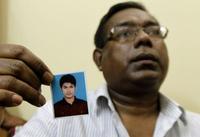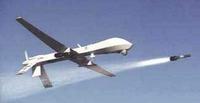-
Major U.K. terrorism trial ends in three convictions
Irfan Naseer, 31, Irfan Khalid, 27, and Ashik Ali, 27, all from Birmingham, were found guilty at Woolwich Crown Court of being “central figures” in a terrorist plot in which, as suicide bombers, they would have carried out an attack which would rival, in scope and destruction, the 7 July and 9/11 terrorist attacks. The prosecution said the three planned to set off up to eight bombs in rucksacks, using timers to detonate the charges. Detectives believe it is the most significant terror plot to be uncovered since the 2006 conspiracy to blow up transatlantic airliners using bombs disguised as soft drinks.
-
-
Keeping an eye on the world’s dangerous chemicals
In the chemistry labs of the developing world, it is not uncommon to find containers, forgotten on shelves, with only vague clues to their origins. The label, if there is one, is rubbed away. Left alone for years, some chemicals can quietly break down into explosive elixirs, and what was once an innocent experiment by a well-meaning scientist becomes a very real, unsecured threat. Should such chemicals fall into malicious hands, the consequences could be widespread and deadly.
-
-
Iran builds 50,000-strong Syrian Alawite militia for post-Assad era

Officers from the Iranian Revolutionary Guard, aided by scores of Hezbollah officers, have been busy building, equipping, and training a new Alawite militia which will continue to protect Iranian and Hezbollah interests in Syria following the inevitable fall of Assad. The Assad regime already has a paramilitary militia, the shabiha, or “ghost,” units. The shabiha, together with Hezbollah fighters from Lebanon, has concentrated on killing Sunni civilians in villages and towns deep inside Alawaite-majority areas. Syria and Hezbollah, however, have been worried for a while that, at the end, the loyalty of the shabaiha is to the Syrian Alawaite minority and its interest. Iran and Hezbollah want to create a well-armed militia which will be loyal to the interests of Iran and Hezbollah. The new, 50,000-strong militia, called Jaysh fighters, is a purely sectarian fighting force overseen by Iranian and Hezbollah commanders and separate from the shabiha paramilitaries.
-
-
Mali crisis will be the topic of Thursday House Foreign Affairs Committee hearing
The House Foreign Affairs Committee will hold a hearing on Thursday, 14 February, entitled, The Crisis in Mali: U.S. Interests and the International Response. “Today in Mali, you have battle-hardened, al-Qaeda-affiliated militants, armed to the teeth with weapons from Qadhafi’s stockpile, seeking safe haven,” said Representative Ed Royce (R-California), the committee chairman.
-
-
Bangladeshi man pleads guilty to trying to blow up the Federal Reserve Bank building

A Bangladeshi man who triedattempted to use a weapon of mass destruction to blow up the New York Federal Reserve Bank has pleaded guilty to the charges. Under the plea agreement, he will faces up to life in prison.
-
-
Number of Muslim-Americans involved in domestic terrorism “vanishingly small”
The number of Muslim-Americans planning or perpetrating terror plots has always been exceedingly small – and it is declining. Fourteen Muslim-Americans were indicted for violent terrorist plots in 2012, down from twenty-one the year before. For the second year in a row, there were no fatalities or injuries from Muslim-American terrorism. For comparison: the United States suffered approximately 14,000 murders in 2012. Since 9/11, Muslim-American terrorism has claimed thirty-three lives in the United States. During the same period, there were more than 180,000 murders committed in the United States.
-
-
Two Iraqi men arrested in Kentucky for aiding al Qaeda

A pair of Iraqi men living in Kentucky were taken into custody and charged with twenty-three separate counts, including terrorism, for allegedly helping al Qaeda carry out attacks on U.S. troops in Iraq. The two men also attempted to send weapons from the United States to the terrorist group.
-
-
Israel’s attacks in Syria indicate Assad’s deteriorating position
Wednesday’s attacks are likely to be the first in a series of attacks which Israel will feel compelled to launch at an ever quickening pace as the Assad regime continues to disintegrate. Israel attacked targets inside Syria before, but not too often, and only when the targets were of strategic value. The deteriorating situation in Syria appears to have persuaded Israel that it has no choice but to renew its military operations inside Syria.
-
-
Promising substance for better cyanide antidote for terrorist attacks
In an advance toward closing a major gap in defenses against terrorist attacks and other mass casualty events, scientists are reporting discovery of a promising substance that could be the basis for development of a better antidote for cyanide poisoning.
-
-
Conflicting cultural identities foster political radicalism
New research suggests that dual-identity immigrants — first-generation immigrants and their descendants who identify with both their cultural minority group and the society they now live in — may be more prone to political radicalism if they perceive their two cultural identities to be incompatible.
-
-
Egypt military chief says country is on verge of “state collapse”
General Abdul Fattah al-Sisi, Egypt’s armed forces chief, has warned the other day that the current political crisis in Egypt “could lead to a collapse of the state.” General al-Sisi said such a collapse could “threaten future generations.” General Sisi suggested that the polarization of the civilian politics was becoming a concern of the military because “to affect the stability of the state institutions is a dangerous matter that harms Egyptian national security.”
-
-
Morsi’s top aid: Holocaust a “hoax” concocted by U.S. intelligence

Fathi Shihab-Eddim, a senior aid to Egypt’s president Morsi, said the other day that Holocaust was “a hoax” concocted by the U.S. intelligence services. Shihab-Eddim also said that six million Jews were never killed – they simply emigrated to the United States.
-
-
Donors pledge $455 million to roll back Islamist influence in Mali
International donors meeting in Ethiopia have pledged $455.53 million for an international campaign to tackle Islamist militants in Mali. The pledged funds for aid projects and the AFISMA (African-led International Support Mission to Mali) force which is scheduled to take over from French troops in the country are about half the figure African leaders had requested.
-
-
Increasing the sensitivity of airport security screening
The latest episode in the American Chemical Society’s (ACS) Global Challenges/Chemistry Solutions podcast series reports a simple way to improve the sensitivity of the test often used to detect traces of explosives on the hands, carry-ons, and other possessions of passengers at airport security screening stations.
-
-
U.S. to build drone base in Niger

With the war in Mali raging, the U.S. Africa Command is now establishing a drone base in northwest Africa in order to bolster U.S. surveillance – and operational — capabilities against Islamist groups in the region. Initially, the drones flying from the base will conduct unarmed surveillance missions, but there is little doubt that if targets present themselves, these drones will be equipped with missiles and go on hunting-killing missions.
-
More headlines
The long view
How Male Grievance Fuels Radicalization and Extremist Violence
Social extremism is evolving in reach and form. While traditional racial supremacy ideologies remain, contemporary movements are now often fueled by something more personal and emotionally resonant: male grievance.
